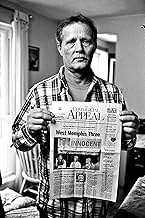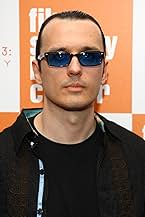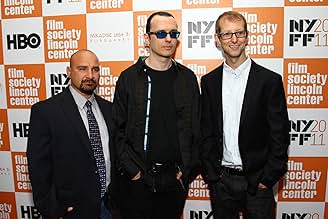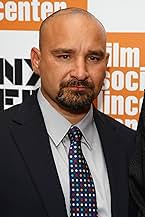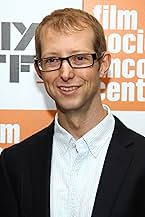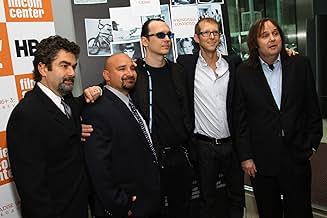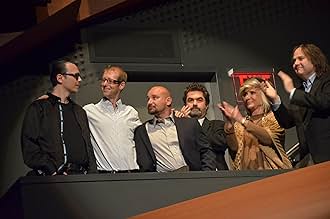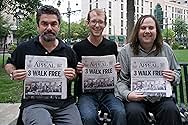Aggiungi una trama nella tua linguaA further followup of the case of the West Memphis Three and the decades long fight to exonerate them that finally gained traction with new DNA evidence.A further followup of the case of the West Memphis Three and the decades long fight to exonerate them that finally gained traction with new DNA evidence.A further followup of the case of the West Memphis Three and the decades long fight to exonerate them that finally gained traction with new DNA evidence.
- Candidato a 1 Oscar
- 5 vittorie e 6 candidature totali
- Self - Former Chief Investigator, West Memphis Police
- (filmato d'archivio)
- Self - Parent of Michael Moore
- (filmato d'archivio)
- Self - Parent of Michael Moore
- (filmato d'archivio)
- Self - Mother of Stevie Branch
- (filmato d'archivio)
- Self - Mother of Christopher Byers
- (filmato d'archivio)
- Self - Perpetrator
- (as Damien Echols)
- Self - Perpetrator
- (as Jessie Misskelley Jr.)
- Self - Prosecuting Attorney
- (as John Fogleman)
- Self - Detective, West Memphis Police
- (filmato d'archivio)
- Self - Suspect's Girlfriend
- (filmato d'archivio)
- Self - Neighbor
- (filmato d'archivio)
- Self - Jason Baldwin's Neighbor
- (filmato d'archivio)
Recensioni in evidenza
This third film picks up with the men having been in prison for 15 years, and finally moving towards possible exoneration under pressure on the Arkansas justice system from across the country and even the world. Mostly the film focuses on the uncovering of yet another possible 'real' killer (although the 2nd film also did so and pointed convincingly at the wrong man, showing just how hard it is to ever fully know the truth). It also shows the lengths to which those involved in the first trial, especially the judge, put their own reputation and their inability to admit error, or even questions, above a search for true justice.
The film has it's flaws; it spends a lot of time re-capping the story, and never seems to acknowledge how confusing the issue of guilt is, as the 2nd film showed in seeming to point at the wrong man for being 'weird', just as the trial did with the 3. Also the dramatic conclusion feels tacked on and incomplete – not the fault of the filmmakers, as much as of timing. The film was essentially done when the directors had to race to Memphis to film a climax that ended up more like an epilogue than it should.
But this is an important document of just how easily the legal system can fail when prejudice and self-interest come into play – as they will continue to do as long as we are human and frail creatures.
Part three is mostly set ten to eleven years after the events of the second 'Paradise Lost' movie, and a lot has changed in the years since the new millennium came around and things like new statutes in the state and new evidence peaks its head into existence (and better legal defenses for the three as well). But there are many surprises; the greatest and most unexpected one is a complete 180 from how one saw John Mark Byers. It may speak to the potential for the filmmakers being manipulative, going from positing him as a villain to something of a redeemed person, but it seems a little more complex than that. One may forget watching this film (it isn't mentioned directly) that at the end of part 2 Byers was off to prison.
Maybe that changed him. Or just ten years and that monumental press conference with the host of legal experts - one from the FBI and one involved in the Ted Bundy case - can change a person's mind. But one of the things that's so absorbing this time around is how Byers, previously a Character with a capital C (one may or may not think watching part 2 he'd be capable of the crimes, it's left up in the air almost by how forceful he was in it), uses his knack for being outspoken for the side of the innocent, which he believes now they are (the dead wife is not mentioned, but that's another story altogether).
If there's one small criticism of the film is that there's a lot of footage from the past two films, with the first one shown from the original negatives (hence why they look so scratchy). But I think it's a necessary narrative angle since by this point there may be people coming to this documentary who may have not seen the other films in a while (or, presumably given the nature of channel-flipping TV and ADD) to bring things up and make it a complete narrative. I actually appreciated the use of footage here more than in part 2, and it helped to make a point-counter-point method for the first half of the film; so much time has passed, after all, that the new experts and lawyers and people of that nature could comment on this or that that was presented before, from the alleged occult symbols (basically debunked here as BS) or, most of all, the lack of DNA.
There's so much that comes down in this film that if one comes away at the end and still thinks Echols, Baldwin and Misskelley killed all three of the boys in 1993 then, well, at the least there's little room for any reasonable doubt in your mind based on ALL of the evidence (and as the chapter heading goes here, All is All). But perhaps the thing that will make me revisit this film over time is the fact that the potential - actual - killer comes up as a *different* father, Terry Hobbs, and while on the surface seeming to be less of a Force of Nature like Mark, he's actually an even more fascinating person to just stare at. Which, by the way, you get a lot of time for; via deposition videos, the audience basically gets to see up front what this guy is all about as far as his actual character. I really loved how the filmmakers didn't have to dig too deep to find moments that revealed this person in a whole new light than one saw in part 1; indeed I want to revisit that first part almost immediately to see if any of the signs were there (those little smirks, the bullish expressions) and if they were hard to miss.
Ultimately the West Memphis 3 were freed, but it was based in layman's terms on the justice system saying 'eh, get the hell out of here.' The Alford Plea let the men out, all now in their 30's, but the catch is that they can say they're innocent but plead guilty. One of the things that makes the form of documentary filmmaking so unpredictable and so vital and, in moments like these, so highly charged that it would be difficult to possibly take as a drama, are the turns a story could take. And yet in the Paradise Lost series, all the way through the end of this saga, there's this sense that the entire Justice system, from the police to the prosecutors (probably they come off not quite AS bad as everyone else, but close enough), to the jurors (or that one juror for sure) to the unmovable judge himself, it's all set up to say 'we are right, and you are wrong.'
There are incredible and serious implications and questions that are raised due to what can be read very easily in this story, and a lot of it has to do with class (would these men have been put away if they came from families outside of trailer parks and low-incomes) and status (the 'black-Satan-occult BS). It's a sobering, harrowing, tragic story, and it's all told by these directors with clarity and focus and urgency.
The murders of three second graders, Stevie Branch, Michael Moore, and Christopher Byers, in May 1993 was horrific and shocked the entire quiet community of West Memphis, Arkansas. It was proved that belief in Satanism was occurring, and the town was hellbent and frustrated to find the heartless brutes responsible for such a heinous, unforgivable crime. Jessie Misskelley Jr. was arrested and interrogated for over twelve hours with no parent or attorney present in the room. Possessing an IQ of only 72 made it very clear that the response we were going to get would be shaky and murky. Only the last forty-five minutes or so were recorded on tape and went on long enough to show Misskelley had contradicted himself on when the murders took place.
During the confession, Misskelley claimed to be involved with Damien Echols and Jason Baldwin, two other West Memphis teenagers. Baldwin, Echols, and Misskelley were all arrested, tried, and sentenced to life in prison and Echols was placed on death row. However, years after their conviction new evidence came forth - bite marks on one of the victim's heads. The three took bite impressions, none of them matching the bite marks on the boy's forehead.
After being denied numerous appeals in the state of Tennessee, the men finally applied for a hearing with the new evidence in the Arkansas Supreme Court. A new hearing would be set for December 2011. Though unexpectedly, in August 2011, the prosecutors and the defense lawyers negotiated a plea that would let the men be released from prison if they pleaded guilty but could maintain their innocence. They accept and now are free on the streets after serving 18 years and 78 days.
Paradise Lost 3: Purgatory spends about forty-five minutes recapping the events that occurred in the first two documentaries, then works around the details developed in present day. We get well conducted interviews with all three men again, and we see how greatly their personalities and attitudes have changed towards the world around them. Jason Baldwin, who didn't speak all that much in the first two films, says some of the most compelling lines in Purgatory. One of them being "Our trial was guilty until proved innocent." Just sends a shiver up your spine.
I've been saying all along that the trial of the three boys seemed to act more on impulse and personality traits of the boys rather than hardcore, indisputable evidence from the crime scene.In Paradise Lost 2: Revelations, the film danced around the fact that Christopher Byers' stepfather, John Mark Byers, might've had something to do with the murders. He is eerie in appearance, outspoken, and very suspicious on camera. Not to mention, he changes his story multiple times on his whereabouts and his false teeth during the time of the murders.
To make a dirty sea even gloomier, Purgatory offers another option that Terry Hobbs, Stevie Branch's stepfather, could've be involved in the murders. His hair was found on one of the shoestrings used to hogtie one of the boys up, and his story, like Byers', changes drastically throughout the film. It's shocking, scary, and sometimes seemingly incorruptible in presentation.
The more I watched of each film the more I grew sympathetic and fond of the three accused. They seem like intelligent people stuck in a merciless and unfair situation. Echols, my favorite of the three, is intelligent yet eclectic - a good trait in many adolescents. Sadly, it got him in a boatload of trouble. More trouble than one could possibly imagine.
This marks the possible end to what could very well be some of the greatest, deepest, most personal and up close documentaries ever captured on film. Paradise Lost isn't only focusing on a largely unfair case, but it is showing the dangers and horrors of a biased system during a serious trial. Not to mention, when finally released they are still baring an essence of guilt. That is not right. Justice did not prevail for these poor kids. They're free, sure, but are they fully innocent? That's another question.
Starring: Damien Echols, Jessie Misskelley Jr., and Jason Baldwin. Directed by: Joe Berlinger and Bruce Sinofsky.
Lo sapevi?
- QuizTodd and Dana Moore, the parents of 8 year-old victim Michael, wrote a letter to the Academy of Motion Pictures Arts and Sciences asking that the film be removed from consideration. In the letter they said that the film glorifies Damien Wayne Echols, Jason Baldwin and Jessie Misskelley. Director Joe Berlinger had in fact acknowledged during an interview with salon.com that he determined Echols was innocent after speaking with him for five minutes prior to the trial. Despite the Moore's request the film was nominated for Best Documentary, Features for the 84th Annual Academy Awards. It lost to Undefeated (2011).
- BlooperMichael's dad says he hopes the West Memphis Three are burned at the stake, like in Salem. He is referring to the Salem witch trials, in which none of the convicted were executed that way. They were hanged. This is a popular misconception, that confuses colonial times with the medieval.
- Citazioni
Damien Wayne Echols: If I focused on the things I can't change, the things that have hurt me, what people have done to me, then they would have already broken me. They would have killed me inside and out. I can get up in the morning and I don't feel sorry for myself, I don't hate my life. You have a lot of people in here that all they can think about is what they don't have and how much they want out and how much they want something else. But for some reason, this situation has helped me to see more of what I do have and to be thankful for that. You know, I have, in a lot of ways, I have a truly incredible life.
- Versioni alternativeThe directors said that audiences at the Toronto International Film Festival in September 2011 would be the only audiences to see the film in that version. The reason is that events which took place the previous month necessitated a new ending to the film.
- ConnessioniFeatured in West of Memphis (2012)
- Colonne sonoreWelcome Home (Sanitarium)
Performed by Metallica
Written by James Hetfield, Lars Ulrich and Kirk Hammett
Published by Creeping Death Music (ASCAP)
Courtesy of Elektra Entertainment Corp
By arrangement with Warner Music Group Film & TV Licensing
I più visti
- How long is Paradise Lost 3: Purgatory?Powered by Alexa
Dettagli
- Tempo di esecuzione2 ore 1 minuto
- Colore
- Proporzioni
- 1.78 : 1



